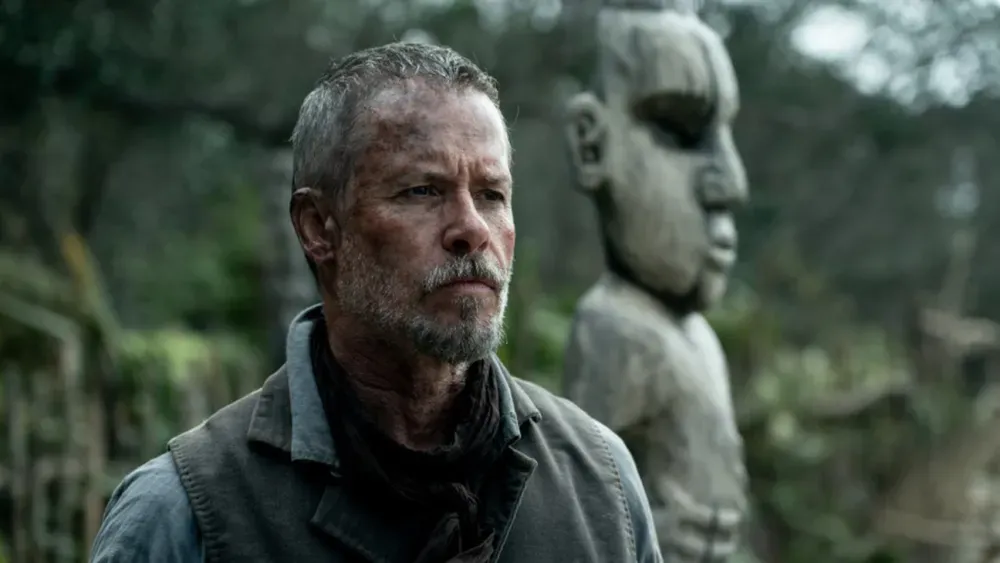Working in his native country appears to rejuvenate New Zealand-born director Lee Tamahori, whose best film remains his 1994 debut feature, Once Were Warriors. Tamahori's Hollywood career has been uneven, with missteps like the Nicolas Cage starrer Next, the poorly received xXx: State of the Union, and the lackluster James Bond film Die Another Day.
 |
| Guy Pearce in 'The Convert.' COURTESY OF MAGNET RELEASING |
However, Tamahori shows a return to form with The Convert, a 19th-century historical drama starring Guy Pearce. The film follows an English minister who travels to New Zealand to preach at a British settlement, only to become entangled in the conflict between warring Maori tribes.
Like Tamahori’s 2016 feature The Patriarch, The Convert is noted for its uneven execution and its struggle to fully achieve its thematic ambitions. However, it distinguishes itself with its handsome production and manages to sidestep the pitfalls of white savior narratives.
Set in 1830, the film begins with Guy Pearce’s character, Munro, traveling by sailing ship with British traders across the Tasman Sea. Upon arrival, Munro navigates through the waters on his white horse, a symbolic image laden with colonial connotations.
His journey takes a dramatic turn when he becomes embroiled in a conflict between Maori tribes, witnessing the murder of Rangimai’s husband. Munro negotiates for Rangimai’s life by trading his horse to the formidable tribal chief Akatarewa, portrayed by Lawrence Makoare with genuine menace. Munro then takes Rangimai to his modest home in the British settlement of Epworth, where he and Charlotte (played by Jacqueline McKenzie), an Irish widow who acts as translator, care for her as she recuperates from her injuries.
In The Convert, Munro confronts the pervasive racism directed at the Indigenous population by the British settlers, exemplified by a doctor's refusal to even examine Rangimai. Meanwhile, he becomes increasingly entangled in the escalating tensions between the two Maori tribes, culminating in a fierce battle where he is drawn into the conflict.
The film's central issue lies in its screenplay, co-written by Lee Tamahori and Shane Danielsen, which fails to delve deeply enough into its characters and situations to maintain engagement. It subverts expectations by avoiding a romantic entanglement between Munro and Rangimai, the young woman he rescued, yet their evolving connection lacks the emotional resonance it seeks to achieve. Moreover, Munro's spontaneous encounter with Charlotte, resulting in a physical relationship, is depicted with a casualness that diminishes its narrative impact.
In The Convert, Munro, portrayed by Guy Pearce with a subdued demeanor, doesn't quite capture the audience's interest or empathy, aside from a poignant moment late in the film where he reveals a traumatic past experience that shaped his path to priesthood. While Pearce's performance isn't lacking in skill, the screenplay itself doesn't offer enough depth to fully explore his character's emotional landscape.
Stepping into the spotlight is Tioreore Ngatai-Melbourne as Rangimai, who emerges as the emotional anchor of the film. Her portrayal injects heart and soul into the narrative, drawing viewers into her character's journey.
Where the film excels is in its portrayal of the Maori characters, who are depicted with complexity and depth, even those who are portrayed as barbaric. The decision to subtitle some of their dialogue, while leaving other parts untranslated, adds an intriguing layer of authenticity and mystery to their interactions. The film meticulously showcases their customs, rituals, attire, weaponry, and facial markings, highlighting a commitment to authentic representation.
Director Lee Tamahori, known for his adept handling of cinematic violence, stages the battle scenes with visceral impact, while Gin Loane's cinematography masterfully captures the sweeping natural landscapes, enhancing the visual appeal of the film.
Despite its technical and cultural strengths, The Convert falls short in narrative depth, failing to fully engage its audience on a profound level.
Film Credits:
Production: Jump Film and Television, Brouhaha Entertainment, MBK Productions
Distributor: Magnolia Films
Cast: Guy Pearce, Tioreore Ngatai-Melbourne, Antonio Te Mahioha, Jacqueline McKenzie, Lawrence Makoare
Director: Lee Tamahori
Screenwriters: Shane Danielsen, Lee Tamahori
Producers: Robin Scholes, Te Kohe Tuhaka, Andrew Mason, Troy Lum
Executive Producers: Maria Logan, Anne Sheehan, David Garrett, David Mepham
Director of Photography: Gin Loane
Production Designer: Nick Williams
Costume Designer: Liz McGregor
Music: Matteo Zingales
Editor: Luke Haigh
Casting: Yvette Reid
Duration: 1 hour 59 minutes

0 Comments